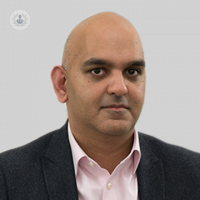All you need to know about atrial fibrillation
Escrito por:Atrial fibrillation is an abnormal heart rhythm which is essentially a chaotic, irregular rhythm generated from the top left chamber in the heart, otherwise called the left atrium. Essentially, abnormal electrical wavelengths come into the heart and take over the normal heart beats. This leads to an irregular pulse and can also worryingly put patients at risk of stroke. We know that strokes related to atrial fibrillation are more severe and can lead to higher mortality.

What are the symptoms of atrial fibrillation?
Atrial fibrillation causes an irregular heartbeat. Not all patients have palpitations, but certainly, a lot of patients feel their heart racing irregularly and palpitations are essentially a sensation of your heart beating abnormally. With atrial fibrillation, the heart can sometimes go very fast but also very slow. Some patients have a normal heart rhythm for a lot of the time and have episodes where their heart beats irregularly. That’s what we call paroxysmal atrial fibrillation. To summarise, palpitations are a symptom. Atrial fibrillation can lead to palpitations and a sensation of your heart beating irregularly or erratically.
Who is more at risk from atrial fibrillation?
Atrial fibrillation is a disease which tends to happen more frequently as we get older, and is often referred to as a disease of the elderly. What that means is that as we age, specifically as we get over 65 and 75, our risk of developing atrial fibrillation increases. However, overall, about half of the patients with atrial fibrillation are younger than 65, though patients of all age ranges can be affected.
What causes atrial fibrillation?
Any heart condition, for example coronary artery disease, high blood pressure, structural heart disease can all increase your risk of developing atrial fibrillation. Of the conditions, particularly diabetes, obstructive sleep apnoea, and high blood pressure can also increase your risk of atrial fibrillation. Finally, our lifestyle factors play a big role in this. Obesity, heavy alcohol consumption and a lack of fitness can all increase your risk of developing atrial fibrillation.
Why does atrial fibrillation lead to a higher risk of stroke?
Atrial fibrillation leads to an irregular heart rhythm and the heart beating irregularly can lead to the formation of blood clots which can potentially cause strokes. Therefore, the most important thing in assessing any patient with atrial fibrillation is what is your risk of stroke?
That is done based on your comorbidities or other conditions such as high blood pressure, your age and from that your risk of stroke is calculated. If your risk of stroke is higher than we’d like, we will start you with a blood thinner or anticoagulant. Once we’ve dealt with your risk of stroke, which may be very, very low in some people and you don’t need to start on blood thinners, we can then start treating the symptoms of atrial fibrillation.
How is atrial fibrillation treated?
Depending on the type of atrial fibrillation you have, we may use medication such as beta blockers or calcium channel blockers to try and prevent episodes of AF and to try and regulate your heart rate.
In some patients who are in AF all the time, we may perform a cardioversion. This is an electric shock where your heart is shocked back to a normal rhythm to see if you benefit. This is done under general anaesthetic and is a very straight forward procedure. However, most patients will revert back to atrial fibrillation following cardioversion, but it is a useful tool to see if you notice an improvement in your symptoms.
Finally, if you have a lot of symptoms and the medication isn’t working or you don't want to take medication or you felt a lot better being in normal rhythm, we can offer you what we call an ablation. This involves passing wires from the top of the leg into the heart and removing or treating the abnormal triggers for AF either using freezing or with high frequency energy.
The success rates depend on the type of atrial fibrillation that you have but in general are very good. The procedure is very safe and carries a small risk of complications and is usually performed as a day case or an overnight stay.
If you are concerned about an unusual heart rhythm, make an appointment with a specialist here.


